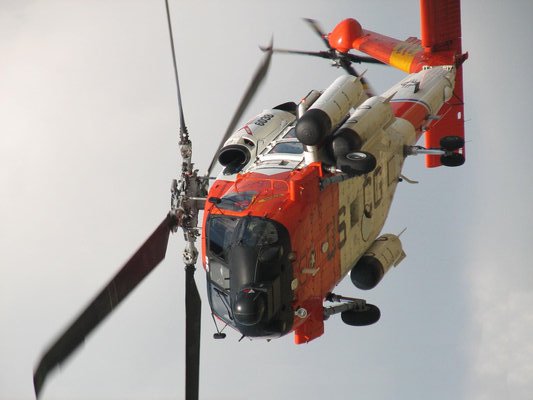Yesterday, John Aldridge, a 45 year old fisherman, kept his head above the shark-infested waters off Montauk with no lifejacket for over eight hours. Miraculously he was found miles away from Long Island's coast hours after he fell off the commercial fishing boat, the Anna Mary. All Aldridge had keeping himself afloat after falling off were his fishing boots and drive to see his family once again.
"The search and rescue coordination between the Coast Guard, its partner agencies and fishermen was exceptional. The fishing crews allowed us to search a much greater area,” said Senior Chief Petty Officer Jason Walter, the officer in charge of Station Montauk, in a press release “To find this man in the water after this much time is amazing."
The search for Aldridge included two rescue boat crews from Station Montauk, two Coast Guard 87-foot rescue Patrol Boats, aircraft and two rescue helicopters, and a few local fishing boats manned by good samiritans. Altogether they covered 660 square miles of water which is the equivalent of 378,000 football fields.
A Coast Guard Jayhawk helicopter from Coast Guard Air Station Cape Cod found Aldridge 43 miles off the coast of Long Island. Aldridge was hoisted up in to the helicopter and sent to Cape Cod Hospital. There he was treated for dehydration, exposure, and hypothermia. He was then transferred to Falmouth Hospital for further evaluation and was released Thursday. Luckily all he walked away with was a major sunburn.
According to the official blog of the U.S. Coast Guard Auxiliary, written by Auxiliarist and East Moriches resident, Vincent Pica, there are three main rules one should follow to avoid falling overboard. The first is no “bow riding.” That means no sitting on the bow of the boat with your feet dangling off to the side. There’s a chance of being knocked unconscious or getting hit with the propellor of the boat as it glides through the top of the water.
The next is no sitting at the edge of the boat. If the boat hits a hard wave you can go flying. Whether you land on the boat or in the water is dependant on where your luck is that day. The last, and probably most important, is the “three point system.” That means you should have at least three body parts touching something on the boat at one time. That could be two hands one foot, or two feet and one hand. This method helps to keep a person grounded when the boat hits a hard wave or if the deck is slippery.
[Source: CBS, U.S. Coast Guard]
Video Courtesy of U.S. Coast Guard Imagery YouTube page.










